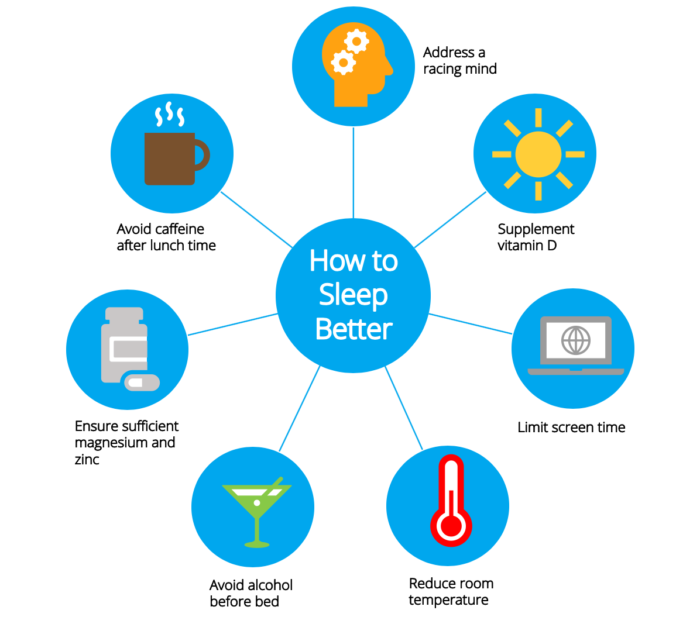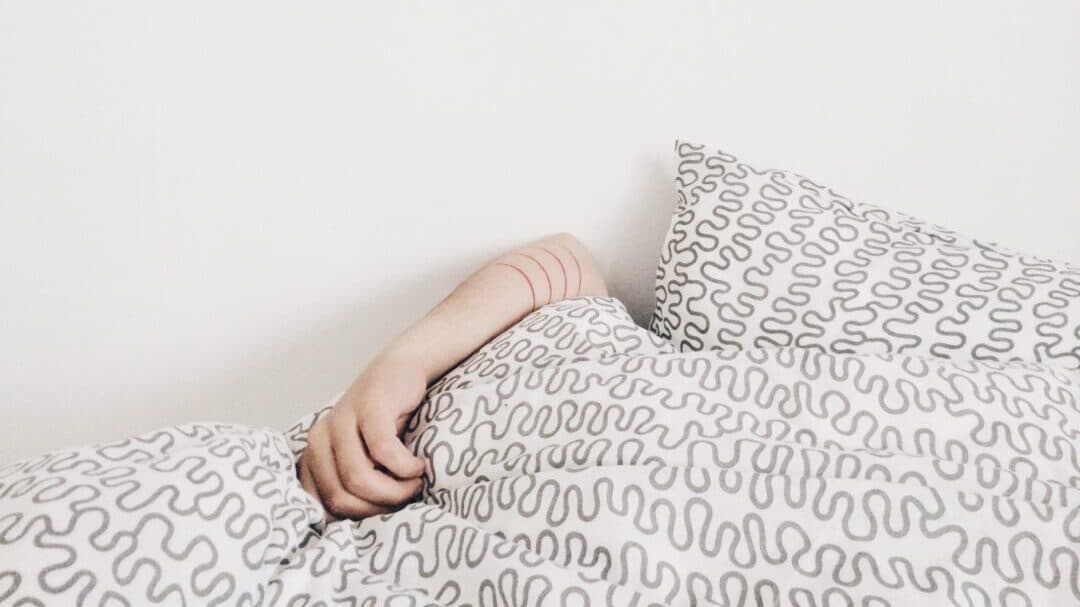Getting a good night’s sleep is essential to almost all aspects of health, from improving mental wellbeing to avoiding long term degenerative diseases including cancer and type 2 diabetes. Chronic poor sleep and sleep problems can lead to weight gain, moodiness and impaired memory amongst other things.
Medication-assisted weight loss with a future focus
Start with Wegovy or Mounjaro, transition to habit-based health with our support


What counts as good sleep?
Normally when you sleep, you initially enter the stage called ‘Non-Rapid Eye Movement’ (non-REM), which is ‘light sleep’ that lasts for about 25 minutes.
Following this, you enter what is known as ‘deep sleep’. Deep sleep is the really critical part of your sleep where your body repairs itself, restores energy, and releases hormones – all the good stuff!
Finally, you enter the first ‘rapid eye movement’ (REM) stage of your sleep about 90 minutes after going to bed. This is the part of your sleep when you typically dream. REM sleep is thought to be involved in the process of storing memories, learning and balancing your mood.
Because your sleep cycle repeats (normally in 90-minute cycles), you enter REM sleep several times during the night. The first period of REM typically lasts 10 minutes. After that, each REM stages gets longer and longer, with the final one potentially lasting up to an hour.
Most people need between 7-9 hours a night to ensure that they are not compromising on the quality of sleep and are completing enough sleep cycles.
Several factors can affect your sleep quality, usually by reducing the amount of deep and REM sleep we experience.
This leads to us waking up feeling exhausted. There are a number of sleep tips we can follow to prevent the quality of our sleep being compromised.
Key points:
- Humans sleep in 90-minute cycles.
- If your deep or REM sleep is interrupted, you will wake up feeling exhausted.

Avoid screen time before bed
Why?
Our bodies have an internal ‘clock’ that is found in the brain. This clock regulates our circadian rhythm, the 24-hour biological cycle that determines when our bodies are primed to stay awake and be productive, and when we feel tired and want to go to sleep.
The circadian rhythm isn’t 100% accurate. Sometimes it is a bit longer than 24 hours, sometimes a bit shorter. For this reason, it needs signals from the external environment in order to adjust itself. The most important signals that adjust this internal sleep-wake cycle are daylight and darkness.
Not all light is created equal. It is primarily light of a blue wavelength (blue light) that stimulates sensors in the eye to send signals to the brain’s internal clock. This keeps us bright and awake during the day, but if we are exposed to it at night, it can ‘trick’ our brain into thinking it is light outside.
The biggest culprits for blue light production are smartphones, TVs, and computer screens.
How?
Avoid looking at any screens for at least 2 hours before going to sleep. If you really need to look at your smartphone, change the display settings. iPhones, for instance, now have a ‘night shift mode’ that reduces blue light, meanwhile, Android’s have ‘Night Light’ which can be switched on under Settings > Device > Display.
You should try and reduce the brightness of other lights in your house in the evening as well. Time exposed to standard lights also has an effect on your sleep. For example, 1 hour exposed to a 1000 lux (lux = measurement of brightness) is similar to 2 hours exposed to a 500 lux brightness.
The best way to do this is to buy a cheap pair of blue-light blocking glasses to wear after 8 pm in your house (they cost about £5-£10). It sounds incredibly geeky, and it is, but it works. Studies show that when people use blue-blocking glasses, even in a lit room or using an electronic device, they produce just as much melatonin as if it were dark.
Key points:
- Blue light from screens at night time can ‘trick’ our brains into thinking it is day time and mess up our sleep schedule.
- Avoid looking at screens 2 hours before going to bed.
- Alternatively, invest in some blue-light blocking glasses.
Address your ‘racing mind’
Why?
You know that feeling when you are trying to get to sleep, but your brain is in overdrive? There seems to be a never-ending list of things you need to remember or worry about. Calming your racing mind before bed by putting pen to paper can help you feel less anxious and more organised.
A recent research study compared the effects of people who wrote a ‘to-do’ list for the next day 5 minutes prior to going to bed, versus writing a journal entry of everything they had achieved that day. The results showed that those who wrote a ‘to-do’ list fell asleep significantly faster. They also found the more specific the list, the faster the person fell asleep.
How?
Take 5-10 minutes before you go to sleep to sit with a notebook and write down a list of anything that you need to do. Next to each task, write when the task needs to be completed by – either tomorrow, this week or this month.
Leave the notebook by your bed and if you wake during the night with another thought, quickly write it down, so you are not dwelling on it overnight.
Key points:
- A racing mind can keep us awake and wake us up in the night
- Write a “to-do” list for the following day just before you go to bed to calm your mind.
Limit caffeine
Why?
Everyone knows that drinking a cup of coffee before bed should be avoided. But do you know how long caffeine stays in your system? It has a half-life (the time it takes for your body to get rid of half of the stuff in your system) of six hours.
So, if you’ve had coffee or tea in the afternoon, say around 4 pm, half of it will still be in your system near bedtime, say around 10 pm.
Many people claim that evening coffee consumption doesn’t affect them as they have no trouble sleeping. Professor of Neuroscience and Psychology at the University of California, Matthew Walker, explains why this is not true using a study that gave participants a cup of coffee in the evening and monitored their sleep quality.
Alarmingly, one dose of caffeine in the evening reduced deep sleep (the restorative type of sleep) by 20%. This is something we are not consciously aware of when we wake up but it leaves us feeling exhausted and, ironically, craving more caffeine to feel alert the following day.
How?
Avoid having caffeinated drinks after lunch time. If you want a hot drink in the afternoon or evening, go for a decaffeinated tea or coffee.
Key points:
- It takes your body 6 hours to remove half of the caffeine you consume.
- Avoid having caffeinated drinks after lunch time.
- Having caffeine in the evenings negatively impacts our deep sleep.
Monitor bedroom temperature
Why?
Our core body temperature decreases when we sleep and increases when we wake up. A sleep environment that is too warm or too cold can cause you to wake up more and decrease the quality of your sleep.
A study recently showed that sleep quality varied according to bedroom temperature and CO2 levels. Those who slept in cooler rooms (roughly 18°C rather than 22°C) with better ventilation (lower CO2 levels) experienced more quality sleep.
How?
Keep bedroom thermostats to around 18°C. During spring/summer try sleeping with your bedroom window open to reduce the temperature and increase ventilation.
In cooler months when this is not practical, try sleeping with your bedroom door open. The study above noted that keeping the door/ window open both significantly increase the ventilation and decrease the temperature compared with keeping the door/ window closed.
Key points:
- Keeping your bedroom well-ventilated and slightly cooler (18°C) promotes better sleep quality.
- Open bedroom windows in warmer months and doors in cooler months.
Limit alcohol in the evenings
Why?
Drinking alcohol close to bedtime affects your brain and how you fall asleep. It is initially a sleep aid; this is where the idea of ‘a drink before bed’ has come from. However, alcohol affects the overall quality of your sleep.
We mentioned earlier that deep sleep is a really critical part of your sleep. Alcohol impacts the amount of deep sleep that you have. While you might initially fall into deep sleep more easily, you then wake up frequently during the night and have poorer deep sleep overall. In addition, it is thought that you experience less REM sleep, meaning you can wake up feeling exhausted.
Alcohol is a diuretic, meaning you lose more body water, so you’ll likely need to go to the bathroom more frequently and will often sweat more too. So even if you have been sensible with your alcohol intake, you may still wake up feeling pretty groggy.
How?
If you tend to have alcohol in the evenings, it is a case of breaking the habit. Usually, we associate a certain time or event with a habit. For example, post-dinner time or a favourite tv show might bring on a strong desire to open a bottle of wine.
Try replacing the alcohol with a non-alcoholic alternative. Sparkling water with a lime wedge and unsweetened peppermint tea are good options as they contain no added sugar and are not caffeinated. That way you are still in line with your habit, and you have something to drink while you relax, but you aren’t consuming alcohol before you go to bed.
Set yourself a challenge to see if you can follow this pattern during the week and save alcohol for a weekend evening. Your wallet will also thank you!
If you are tempted to drink large amounts of alcohol on occasion in social situations, try ordering small options and alternating alcoholic drinks with sparkling water. Alternatively, offer to be the designated driver for the evening and you’ve got yourself a great reason to avoid alcohol altogether.
Key points:
- Alcohol before bed influences the amount of deep and REM sleep you experience.
- Try swapping an alcoholic drink for a decaffeinated hot drink or sparkling water.
- A good goal to set yourself is to avoid drinking alcohol on weekday evenings.
Supplement vitamin D
Why?
Vitamin D is a fat-soluble nutrient that is important for bone health, immune health, increased cognition and general wellbeing. We know that we need vitamin D to help absorb calcium and phosphate from our diet, which are both important minerals for healthy bones, teeth, and muscles.
A new area of research suggests that Vitamin D plays a role in sleep. A large review on the topic noted that overall, the evidence suggests a link between vitamin D deficiency and sleep disorders. Sleep disorders include lack of sleep, reduced sleep quality, and ‘sleepiness’.
Supporting this, a recent clinical trial, published in the Nutritional Neuroscience Journal, demonstrated that supplementing adults with a sleep disorder with Vitamin D significantly increased the quality of their sleep.
Obviously, this trial cannot tell us much about vitamin D deficiency in healthy individuals, but the evidence is promising. More clinical trials are necessary, but evidence for the link between Vitamin D and sleep quality is promising.
The potential mechanism is that vitamin D receptors are common in nearly all tissues of the body and in numerous areas of the brain known to play a role in sleep regulation. Hence, supplementing Vitamin D might help with sleep regulation.
During the summer months, our main source of vitamin D is from the natural action of sunlight on our skin. During winter, however, Vitamin D must be sourced from food sources or dietary supplements. Apart from oily fish, natural foods contain little vitamin D.
How?
Vitamin D is widely available online and from most pharmacies. If you are unsure if this is appropriate or how much you need, please seek advice from your GP.
Studies suggest that the D3 form of vitamin D is more effective than D2 for raising and maintaining serum levels of Vitamin D. So if you buy supplements look out for the D3 type.
The NHS currently recommends a daily supplement of 400 IU. However, recent research suggests that nearer 1,000-2,000 IU is necessary to maintain healthy blood levels of vitamin D, and even 5,000 IU for those who are deficient. There is little evidence for values up to 10,000 IU being toxic, but few people need more than 4,000 IU per day. Overall, 2,000 IU appears to be safe and effective for the average, healthy adult. If you are pregnant or have any health conditions, we recommend discussing this with your GP first.
Key points:
- Although a novel research area, evidence suggests that Vitamin D improves sleep quality.
- Since foods contain little Vitamin D, a D3 supplement can be beneficial.
- Daily supplements of 2,000 IU seems safe and effective for most adults.
Ensure sufficient intake of magnesium and zinc
Why?
Research is in its infancy about whether other micronutrients can directly impact sleep quality, but there are some promising clinical trials emerging.
A trial demonstrated that supplementing elderly individuals living with insomnia with magnesium, zinc, and melatonin improved sleep quality.
There have also been trials suggesting that both zinc and magnesium individually improve sleep quality.
Although encouraging, these trials were conducted using different populations – some were older adults with insomnia, and some were healthy, young adults. This means that we can’t draw conclusions to make recommendations for the whole population and more clinical trials are necessary to confirm this effect.
How?
Currently, there is insufficient clinical evidence to suggest supplementation of magnesium and zinc is effective in improving sleep quality, so it is probably best to ensure you are not deficient and get your fix from whole foods.
Foods high in magnesium include spinach, kale, avocado, bananas, cashews, and seeds. Foods high in zinc include meat, oysters, crab, cheese, cooked lentils, and dark chocolate (70%+).
All of these foods can be included as part of a balanced diet. You should speak to your GP if you are concerned that you are not getting enough zinc or magnesium through your diet.
Key points:
- Magnesium and zinc have recently been linked to sleep quality.
- Until more clinical trials take place, it is best to ensure you get enough of these minerals from whole food sources.
Take home message
- Most people need between 7-9 hours a night to ensure that they are completing enough sleep cycles.
- Avoid looking at screens 2 hours before bed or invest in some blue light blocking glasses.
- Write a “to-do” list for the following day just before you go to bed to calm your mind.
- Having caffeine after lunchtime can reduce the amount of deep sleep we get.
- Keeping your bedroom well-ventilated and slightly cooler (18°C) promotes better sleep quality.
- Alcohol can initially aid sleep but reduces the quality of your sleep.
- Supplementing vitamin D3 can help improve sleep quality.
- Some evidence suggests that zinc and magnesium supplementation can improve sleep quality, but until there is more research we should aim to get enough of these minerals from foods.


